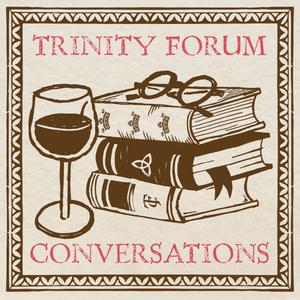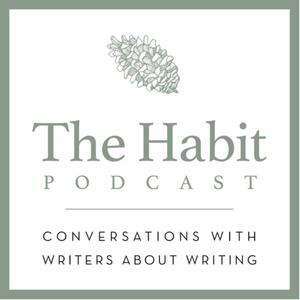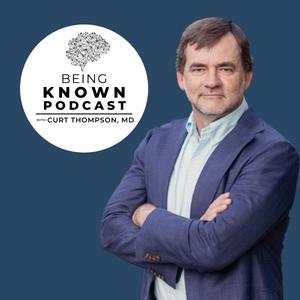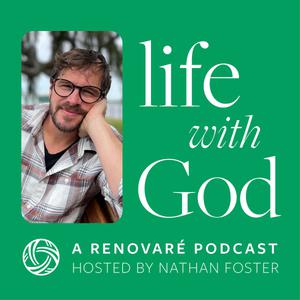
Trinity Forum Conversations
The Trinity Forum
Trinity Forum Conversations is a podcast exploring the big questions in life by looking to the best of the Christian intellectual tradition and elevating the voices, both ancient and modern, who grapple with these questions and direct our hearts to the Author of the answers.
- 35 minutes 35 secondsPracticing the Way with John Mark Comer
Practicing the Way with John Mark Comer
The start of a new year prompts the reflection that if we are not intentionally modeling our life after Jesus, we are likely being formed by something or someone else. Adrift in the cultural current, we're likely to be carried to places we never consciously chose and wonder how we got there.
“ It seems to me that the telos of the spiritual journey in the Christian way is becoming a person of love through deepening union with the Father and the Son and the Holy Spirit…It's the two greatest commandments: love the Lord your God with all your heart, soul, mind, and strength, and love your neighbor as yourself, that Jesus put at the center of apprenticeship to him.” - John Mark Comer
In Practicing the Way, John Mark Comer explores what it means in our times to be a disciple of Jesus -- to be with him, to become like him, and to do as he did:We hope this conversation encourages you to move slowly as you abide with Jesus this year, and by his grace are transformed into a person of deeper love, joy, and peace.
This podcast is an edited version of a conversation recorded in 2024. Learn more about John Mark Comer.
Episode outline
00:00 Introduction to Practicing the Way
01:00 Formation is Inevitable
02:26 John Mark Comer's Background and Influences
05:21 Evangelical Discipleship and the Influence of Dallas Willard
08:05 From Burnout to the Inner Journey
11:26 Being Christian and Being an Apprentice of Jesus
21:04 The Destructive Power of Hurry, and the Pace of Love
26:13 The Practice of Contemplation and Abiding
33:17 Final Thoughts and PrayerAuthors and books mentioned in the conversation:
The Ruthless Elimination of Hurry, Live No Lies, God Has a Name, Garden City, Practicing the Way, all by John Mark Comer
Divine Conspiracy, by Dallas Willard
Jacques Philippe
St. Therese
N.T. Wright
Gary Haugen
Robert Bellah
Mother Teresa
Dorothy Day
Francis Chan
John Stott
Three Mile an Hour God, Kosuki Koyama
Mary Oliver
Marjorie Thompson
Kurt Thompson
Brennan Manning
Related Trinity Forum Readings:
Augustine's Confessions, with an introduction by James K. A. Smith
Bright Evening Star, by Madeleine L’Engle
A Practical View of Real Christianity, by William Wilberforce
Wrestling with God, by Simone Weil
Pilgrim's Progress, by John Bunyan
Pilgrim at Tinker Creek, by Annie Dillard
Why God Became Man, by St. Anselm
Related Conversations:
Making as a Spiritual Practice with Mako FujimuraWriting as a Spiritual Practice with Jonathan Rogers, Tish Harrison Warren, and Doug McKelvey
Walking as a Spiritual Practice with Mark Buchanan
To listen to this or any of our episodes in full, visit ttf.org/podcast and to help make content like this possible, join the Trinity Forum Society
Special thanks to Ned Bustard for our podcast artwork.
7 January 2025, 5:05 am - 49 minutes 28 secondsWaiting on the Word with Malcolm Guite
On Friday, December 18, 2020, in partnership with Regent College, The Rabbit Room, and The C.S. Lewis Foundation we were delighted to host the renowned poet, singer-songwriter, and Anglican priest Malcom Guite for a conversation about his work of poetry, Waiting on the Word.
Learn more about Malcolm Guite.
Watch the full Online Conversation and read the transcript from December 2020.
Authors and books mentioned in the conversation:
Waiting on the Word, Malcolm Guite
As You Like It, Shakespeare
John Milton
Robert Louis Stevenson
C.S. Lewis
Samuel Taylor Coleridge
Christmas, by John Betjeman
North, by Seamus Heaney
St. John of the Cross
A Midsummer Night's Dream, Shakespeare
The Forge, by Seamus Heaney
O Sapientia, Malcolm Guite
Thomas Clarkson
George Herbert
The Apologist's Evening Prayer, C.S. Lewis
The Agonie, by George Herbert
John Donne
Gerard Manley Hopkins
Station Island XI, Seamus Heaney and St. John of the Cross
Adam Crothers
The Chronicles of Narnia, by C.S. Lewis
In the Bleak Midwinter, Christina Rossetti
In Drear Nighted December, by John Keats
Alfred, Lord Tennyson
William Wordsworth
T.S. Eliot
Hebrew Melodies, Lord Byron
Percy Bysshe Shelley
Geoffrey Chaucer
Related Trinity Forum Readings:
Devotions, by John Donne and paraphrased by Philip Yancey
God’s Grandeur: The Poems of Gerard Manley Hopkins
Four Quartets, by T.S. Eliot with an introduction by Makoto Fujimura
Related Conversations:
Lecture given by Malcolm for the C.S. Lewis Foundation
Laing Lectures given by Malcolm at Regent College
Steve Bell & Malcolm Guite: Live at the West End
Special thanks to Ned Bustard for the artwork and Andrew Peterson for the music.
24 December 2024, 7:00 am - 31 minutes 31 secondsHeaven & Nature Sing with Hannah Anderson
Heaven & Nature Sing with Hannah Anderson
Advent invites us to enter into the joy of the season through rhythms of remembrance, renewal, and waiting. But often, our very familiarity with the Advent story can leave us dulled to the miracle and joy of the season.
In her book of Advent reflections, Heaven and Nature Sing, author Hannah Anderson invites us all into a fresh reading of the Christmas story by drawing together 25 meditations on the beauty of creation:
“What I believe creation invites us back to is reorienting ourselves, not only to God, but to our environment and perhaps even to our own bodies and to ourselves. And so when we are giving our attention to the patterns and rhythms and cycles of creation it has the potential to be an access point for some deeper truths that maybe we've forgotten or we've overlooked.” - Hannah AndersonThis podcast is an edited version of a conversation recorded in fall of 2022. Learn more about Hannah Anderson.
Episode outline
00:00 Welcome and Introduction to Advent
01:51 Introducing Hannah Anderson and Her Work
02:28 The Inspiration Behind 'Heaven and Nature Sing'
04:39 Attentiveness to Creation and Its Lessons
07:57 The Link Between Caring for Creation and Others
11:58 The Legend of the First Christmas Tree
15:27 Jesus' Birth and the Concept of Habitat
19:11 The Brutality and Honesty of Nature
22:49 Reconnecting with Nature in Modern Times
26:49 Practical Steps to Attune to Nature
29:32 Closing Thoughts and Poem
31:07 Final Farewell and Podcast Information
Authors and books mentioned in the conversation:
All That's Good: Recovering the Lost Art of Discernment, by Hannah Anderson
The Turning of Days: Lessons from Nature, Season, and Spirit, by Hannah Anderson
Heaven and Nature Sing, by Hannah Anderson
An Immense World, by Ed Yong
Related Trinity Forum Readings:
Bright Evening Star, by Madeleine L’Engle
Pilgrim at Tinker Creek, by Annie Dillard
Babette’s Feast, by Isak Dinesen
A Christmas Carol, by Charles Dickens
The Gift of the Magi and Two Thanksgiving Gentlemen, by O. Henry
God’s Grandeur: the Poems of Gerard Manley Hopkins
Related Conversations:
Waiting on the Word, with Malcolm GuiteJoy to the World: Caroling Christmas and Christian Formation, with Keith Getty
Advent: The Season of Hope, with Tish Harrison Warren
To listen to this or any of our episodes in full, visit ttf.org/podcast and to help make content like this possible, join the Trinity Forum Society.
10 December 2024, 5:10 am - 30 minutes 45 secondsAbraham Kuyper's Sphere Sovereignty with Vincent Bacote
Abraham Kuyper’s Sphere Sovereignty with Vincent Bacote
In this episode of the Trinity Forum Conversations podcast, host Brian Daskam and guest Dr. Vincent Bacote explore Dutch theologian Abraham Kuyper’s contributions to Reformed theology, with particular emphasis on his concept of sphere sovereignty:
“Kuyper helps us to see that we can be Christian in public spaces without having to turn those public spaces into churches and that we don't have to have a triumphalistic aspiration in order to be faithful in those spaces.” - Dr. Vincent BacoteKuyper believed that different domains of life, such as church, government, education, and family, each have their own integrity and should operate independently within their God-given roles. As Dr. Bacote argues, Kuyper's ideas can help modern Christians engage more faithfully and imaginatively in public life without succumbing to triumphalism or tribalism. They also address Kuyper's controversial views on race and how to critically appreciate his positive contributions despite his flaws.
This podcast is an edited version of a conversation recorded in fall of 2024. Learn more about Vincent Bacote.
00:00 Introducing Dr. Vincent Bacote, professor and Trinity Forum Senior Fellow
00:57 Who is Abraham Kuyper?
01:54 Understanding Kuyper’s Concept of Sphere Sovereignty
04:33 Sphere Sovereignty in Practice
14:35 Kuyper's Views on Race
21:36 Applying Kuyper's Ideas Today
32:10 Vince’s Thoughts on Christians Shaping Culture
Authors and books mentioned in the conversation:
The Spirit in Public Theology, Appropriating the Legacy of Abraham Kuyper, by Vincent Bacote
Contours of the Kuyperian tradition, by Craig Bartholomew
Related Trinity Forum Readings:
Wrestling with God, Simone Weil
Children of Light and Children of Darkness, by Reinhold Niebuhr
Politics, Morality, and Civility, by Vaclav Havel
The Origins of Totalitarianism, by Hannah Arendt
A Practical View of Real Christianity, by William Wilberforce,
Who Stands Fast? by Dietrich Bonhoeffer
Related Conversations:
Hope Beyond Tribalism with James MumfordFaith, Fear & Conspiracy with David French
The Fall, the Founding and the Future of American Democracy
How to Be a Patriotic Christian
Extremism and the Path Back to Peace with Elizabeth Neumann
Democracy & Solidarity with James Davison Hunter and David BrooksTo listen to this or any of our episodes in full, visit ttf.org/podcast and to help make content like this possible, join the Trinity Forum Society
Special thanks to Ned Bustard for our podcast artwork.
26 November 2024, 5:05 am - 53 minutes 28 secondsDemocracy & Solidarity with James Davison Hunter and David Brooks
Democracy & Solidarity with James Davison Hunter and David Brooks
One of the biggest questions in the Christian life is what it means to love one's neighbor, both in the personal and the public spheres. While these questions have always been challenging and contested, they seem to have grown increasingly divisive and demoralizing.
So how do we begin to restore and reweave solidarity and a love for neighbor into our civic fabric?
“Until we understand the depth that the enemy is in fact not the other side, but in fact the enemy is the nihilism that insinuates itself within almost all of our public institutions, and not least our political institutions, we're really not taking the full measure of the crisis in front of us.” - James Davison Hunter
Today's episode features our recent evening conversation with sociologist and author James Davision Hunter and cultural critic and author David Brooks. Together they help us explore the cultural roots of America's crisis of solidarity, and what it may mean to move together towards a renewed commitment to the common good.We hope this conversation helps you consider how you’re engaging in relationships, and how the smallest acts of seeing another person and listening to their story can help begin to restore our social fabric and establish new cultural norms.
This podcast is an edited version of an online conversation recorded in September of 2024. Watch the full video of the conversation here, and learn more about James Davison Hunter and David Brooks.
Authors and books mentioned in the conversation:
Culture Wars by James Davison Hunter
The Death of Character by James Davison Hunter
Science and the Good by James Davison Hunter
To Change the World by James Davison Hunter
Democracy and Solidarity by James Davison Hunter
The Social Animal by David Brooks
The Road to Character by David Brooks
The Second Mountain by David Brooks
How to Know a Person by David Brooks
George Marsden
Aristotle
The Public Philosophy, by Walter Lippman
Arthur Schlesinger
John Bowlby
Parker Palmer
David Hume
Edmund Burke
Eddie Hillison
Simone Weil
Mother Theresa
American Politics: The Promise of Disharmony, by Sam Huntington
Clarence Thomas
The Upswing, by Robert Putnam
Howard Usock
Nicholas Epley
The Communist Manifesto
Related Trinity Forum Readings:
Wrestling with God, Simone Weil
Children of Light and Children of Darkness, by Reinhold Niebuhr
Politics, Morality, and Civility, by Vaclav Havel
The Origins of Totalitarianism, by Hannah Arendt
A Practical View of Real Christianity, by William Wilberforce,
Who Stands Fast? by Dietrich Bonhoeffer
Related Conversations:
Hope Beyond Tribalism with James MumfordFaith, Fear & Conspiracy with David French
The Fall, the Founding and the Future of American Democracy
How to Be a Patriotic Christian
Extremism and the Path Back to Peace with Elizabeth Neumann
To listen to this or any of our episodes in full, visit ttf.org/podcast and to help make content like this possible, join the Trinity Forum Society
Special thanks to Ned Bustard for our podcast artwork.
12 November 2024, 5:05 am - 35 minutes 11 secondsExtremism and the Path Back to Peace
Extremism and the Path Back to Peace with Elizabeth Neumann
The appropriation of Christian images and language by extremists who advocate violence has become a shocking feature of our time. Surveys show alarming numbers of people who self-identify as religious expressing openness to political violence. Against such a distortion of Christian witness, how can we faithfully live out our calling to be people of peace?
Today's episode features our recent conversation with national security expert Elizabeth Neumann, who offers insight and a sobering perspective on how radicalization has taken root among us and what we can do:“Find ways to check your in-group assumptions about their narratives. Particularly when the narratives involve others.” - Elizabeth Neumann
As we approach a national election, we hope this conversation helps you thoughtfully evaluate your own assumptions, and strengthens you to serve as a non-anxious presence within your broader community.
This podcast is an edited version of an online conversation recorded in October of 2024. Watch the full video of the conversation here, and learn more about Elizabeth Neumann.
Authors and books mentioned in the conversation:
Kingdom of Rage: the Rise of Christian Extremism and the Path Back to Peace, by Elizabeth Neumann
Related Trinity Forum Readings:
Children of Light and Children of Darkness, by Reinhold Niebuhr
Politics, Morality, and Civility, by Vaclav Havel
The Origins of Totalitarianism, by Hannah Arendt
A Practical View of Real Christianity, by William Wilberforce,
Who Stands Fast? by Dietrich Bonhoeffer.
Related Conversations:
Hope Beyond Tribalism with James MumfordFaith, Fear & Conspiracy with David French
The Fall, the Founding and the Future of American Democracy
How to Be a Patriotic Christian
To listen to this or any of our episodes in full, visit ttf.org/podcast and to help make content like this possible, join the Trinity Forum Society
29 October 2024, 4:05 am - 41 minutes 49 secondsReissue: The Challenge of Christian Nationalism with Mark Noll and Vincent Bacote
The Challenge of Christian Nationalism with Mark Noll and Vincent Bacote
As the lines between faith, politics, and patriotism have become, in some quarters, increasingly blurred, it is increasingly important to understand the origin, ideas, and consequences of Christian Nationalism — what it means, why it matters, and how best to respond.
“Responsible Christian patriots try to show how Christianity can be a service to the nation; extreme nationalists make Christianity a servant of the nation.” - Mark Noll“If you think about the cross: patriotism, rightly construed from a Christian point of view, will put the flag at the foot of the cross. Christian nationalism wants to drape the [flag] over them. So is God serving your country, the sponsor of your country, or are you, as a Christian, operating wherever you are and having loyalty, but not your primary loyalty to your country over God?” - Vincent Bacote
We hope you find this conversation insightful and helpful as you consider the state of our culture and shared political life, and your role in reviving responsible Christian patriotism.
This podcast is an edited version of an Online Conversation recorded in June of 2021. You can access the full conversation with transcript here. Learn more about Mark Noll and Vincent Bacote.
Authors and books mentioned in the conversation:The Scandal of the Evangelical Mind by Mark Noll
God and Race in American Politics: A Short History, by Mark Noll
The Civil War as Theological Crisis, by Mark Noll
In the Beginning Was the Word: The Bible in American Public Life, by Mark Noll
The Political Disciple, A Theology of Public Life, by Vincent Bacote
Reckoning with Race and Performing the Good News, by Vincent Bacote
The Spirit in Public Theology: Appropriating the legacy of Abraham Kuyper, by Vincent Bacote
Related Trinity Forum Readings:A Narrative of the Life of Frederick Douglass
City of God by St. Augustine of Hippo
Children of Light and Children of Darkness by Reinhold Niebuhr
Letter from a Birmingham Jail by Rev. Martin Luther King Jr.
Related Conversations:
Rebuilding our Common Life with Yuval Levin
The Challenge of Christian Nationalism with Mark Noll and Vincent Bacote
The Decadent Society with Ross Douthat
Science, Faith, Trust and Truth with Francis Collins
Beyond Ideology with Peter Kreeft and Eugene Rivers
Justice, Mercy, and Overcoming Racial Division with Claude Alexander and Mac Pier
Healing a Divided Culture with Arthur Brooks
After Babel with Andy Crouch and Johnathan Haidt
Trust, Truth, and The Knowledge Crisis with Bonnie Kristian
Hope in an Age of Anxiety with Curtis Chang & Curt Thompson
To listen to this or any of our episodes in full, visit ttf.org/podcast and to join the Trinity Forum Society and help make content like this possible, join the Trinity Forum Society
Special thanks to Ned Bustard for our podcast artwork.15 October 2024, 5:00 am - 38 minutes 53 secondsTruth & Trust with Francis Collins
What does wisdom mean for Christians in an age of polarization, cynicism, and distrust? In confronting the unique concerns of our time, what can help us become wise?
On our podcast, Dr. Francis S. Collins joins us to discuss his new book, The Road to Wisdom, illuminating how truth, science, faith, and trust work together to help us discern the best path forward in life:
“I think the time has come for many of us to say, I think I need to be part of a solution here. I need to say, it's not enough to say things shouldn't be like this. I'm ready to say, I shouldn't be like this. Let me try to get my house in order, get my worldview reset to the truth, to faith, if that's who I am, and not let all of this other noise out there knock me off my road to wisdom in a way that's bad for me and bad for my society.” - Francis CollinsWe hope this conversation helps you reflect on the acquisition of wisdom, and how Christians in particular might become agents of healing and trust building in the midst of a cynical and polarized culture.
This podcast is an edited version of an online conversation recorded in September 2024. Watch the full video of the conversation here, and learn more about Francis Collins.
Authors and books mentioned in the conversation:
Rev. Martin Luther King Jr.
Jonathan Haidt
The Road to Wisdom, by Francis S. Collins
The Language of God, by Francis S. Collins
René Descartes
David Hume
Related Trinity Forum Readings:
Telling Truth to Kings, by Reinhold Schneider
Brave New World, by Aldous Huxley
Politics and the English Language, by George Orwell
The Wager, by Blaise Pascal
The Lost Tools of Learning, by Dorothy Sayers
Related Conversations:
Connecting Spiritual Formation & Public Life with Michael Wear
The Kingdom, the Power & The Glory with Tim Alberta
A Life Worth Living with Miroslav Volf
Towards a Better Christian Politics
Christian Pluralism: Living Faithfully in a World of Difference
What Really Matters with Charlie Peacock and Andi Ashworth
Scripture and the Public SquareHow to be a Patriotic Christian
Life, Death, Poetry & Peace with Philip Yancey
The Fall, the Founding, and the Future of American Democracy
Fear and Conspiracy with David French
Words Against Despair with Christian Wiman
Hope Beyond Tribalism with James Mumford
To listen to this or any of our episodes in full, visit ttf.org/podcast and to help make content like this possible, join the Trinity Forum Society
Special thanks to Ned Bustard for our podcast artwork.1 October 2024, 4:05 am - 27 minutes 59 secondsHope Beyond Tribalism with James Mumford
Hope Beyond Tribalism with James Mumford
Amidst a culture of political tribalism and personal loneliness, how can we more clearly, creatively, charitably, and faithfully think and engage with our neighbors? What kinds of practices of mind, body, and spirit, might help us to see and act with greater empathy and understanding?
In his book, Vexed: Ethics Beyond Political Tribes, author James Mumford considers these questions and how often our ethical convictions get politically bundled up with others in what he calls a kind of “package deal.”
It’s in examining our own convictions, and the exercise of the moral imagination that we can begin to move beyond tribalism into a greater freedom:
“The sort of engagement relationally that I'm talking about, it's very different from the sort of combative exchange that we see on social media. And so it is a counter cultural project, I think, to disengage, to question our own assumptions, and then also to engage with other people about their own assumptions and their own convictions and how those fit together.” - James MumfordWe hope this conversation helps you to think more clearly about your own convictions, and to view your neighbors, even those with whom you disagree, with greater empathy.
This podcast is an edited version of an online conversation recorded in June 2020. Watch the full video of the conversation here, and learn more about James Mumford.
Authors and books mentioned in the conversation:
Vexed: Ethics Beyond Political Tribes, by James Mumford
The Righteous Mind, by Jonathan Haidt
T. S. Eliot
Related Trinity Forum Readings:
Four Quartets - T.S. Eliot
Children of Light and the Children of Darkness, by Reinhold Niebuhr
Democracy in America, Alexis de Tocqueville
Babette’s Feast, by Isak Dinesen
Politics, Morality, and Civility, by Václav Havel
Related Conversations:
Connecting Spiritual Formation & Public Life with Michael Wear
The Kingdom, the Power & The Glory with Tim Alberta
A Life Worth Living with Miroslav Volf
Towards a Better Christian Politics
Christian Pluralism: Living Faithfully in a World of Difference
What Really Matters with Charlie Peacock and Andi Ashworth
Scripture and the Public SquareHow to be a Patriotic Christian
Life, Death, Poetry & Peace with Philip Yancey
The Fall, the Founding, and the Future of American Democracy
Fear and Conspiracy with David French
Words Against Despair with Christian Wiman
To listen to this or any of our episodes in full, visit ttf.org/podcast and to help make content like this possible, join the Trinity Forum Society
Special thanks to Ned Bustard for our podcast artwork.17 September 2024, 4:05 am - 32 minutes 1 secondWords Against Despair with Christian Wiman
Words Against Despair with Christian Wiman
As poet Christian Wiman explains on our podcast, despair is part of the human condition: “I deal with despair because…I don't know how not to, and it would be an evasion not to. And I think if you don't feel it, then you're not paying attention.”
In his new book, Zero at the Bone: Fifty Entries Against Despair, the acclaimed poet chases meaning through words, including memoir and poetry. And in this conversation he explains how he has found relief from despair in poetry, even and especially when poets grapple honestly with despair, “they speak of [despair] as a thing that can be spoken of.”
Wiman returned to Christian faith in part through a terminal cancer diagnosis–one that he has, to his astonishment, now lived with for over 18 years. His work explores themes of illness, love, faith, and the “almost spiritual joy” of encountering a deadly coral snake. We trust you will find in his poetry, and in this conversation with Trinity Forum’s guest host, Tom Wash, a great tonic against despair.
This podcast is an edited version of an online conversation recorded in April 2024. Watch the full video of the conversation here, and learn more about Christian Wiman.
Authors and books mentioned in the conversation:
Zero at the Bone: Fifty Entries Against Despair, by Chrisitan Wiman
Marylin Robison
Danielle Chapman
William Bronk
William Wordsworth
Every Riven Thing, by Christian Wiman
My Bright Abyss: Meditations of a Modern Believer, by Christian Wiman
Prayer, by Carol Ann Duffy
The Bible and Poetry, by Michael Edwards
Augustine of Hippo
Bittersweet, by George Herbert
Surprised by Joy, by C.S. Lewis
Richard Wilbur
Jürgen Moltmann
When the Time’s Toxins, by Christian Wiman
Related Trinity Forum Readings:
Devotions by John Donne, paraphrased by Philip Yancey
God’s Grandeur: the Poems of Gerard Manley Hopkins
Bulletins from Immortality, by Emily Dickinson
Wrestling with God, by Simone Weil
Related Conversations:
Connecting Spiritual Formation & Public Life with Michael Wear
The Kingdom, the Power & The Glory with Tim Alberta
A Life Worth Living with Miroslav Volf
Towards a Better Christian Politics
Christian Pluralism: Living Faithfully in a World of Difference
What Really Matters with Charlie Peacock and Andi Ashworth
Scripture and the Public SquareHow to be a Patriotic Christian
Life, Death, Poetry & Peace with Philip Yancey
The Fall, the Founding, and the Future of American Democracy
Fear and Conspiracy with David French
To listen to this or any of our episodes in full, visit ttf.org/podcast and to help make content like this possible, join the Trinity Forum Society
Special thanks to Ned Bustard for our podcast artwork.3 September 2024, 4:05 am - 35 minutes 4 secondsFaith, Fear & Conspiracy with David French
In his book, Divided We Fall, author David French explores not only the rise of conspiracy thinking, but also the tribalism and alienation that has divided the country. On our podcast, French considers why our unsettling times have proven fertile ground for the growth of conspiracy thinking, especially within the Christian community, and he offers his thoughts on what a Christian response to conspiracy theories might entail:
“Media consumption that is not thoughtfully curated can actually be quite harmful to our perceptions of reality and our fellow man.” - David FrenchThis podcast is an edited version of an online conversation recorded in 2021. Watch the full video of the conversation here, and learn more about David French.
Especially in these chaotic times, we hope this conversation will inspire you to grow in your faith and find the freedom that comes in the pursuit of truth and the ways of its Author.
Authors and books mentioned in the conversation:
The Rise of Isis: A Threat We Can't Ignore, by David French
A Season for Justice: Defending the Rights of Christian Home School and Church, by David French
Home and Away: A Story of Family in Time of War, by David French
Divided We Fall, by David French
Rod Dreher
Cass Sunstein
Bill Bishop
Jonathan Haidt
Related Trinity Forum Readings:
Brave New World, by Alduos Huxley
Democracy in America, by Alexis de Tocqueville
Politics, Morality, and Civility, by Vaclav Havel
Children of Light, Children of Darkness, by Reinhold Niebuhr
Related Conversations:
A New Year With The Word with Malcolm Guite
Music, Creativity & Justice with Ruth Naomi Floyd
Pursuing Humility with Richard Foster and Brenda Quinn
Reading as a Spiritual Practice with Jessica Hooten Wilson
Walking as a Spiritual Practice with Mark Buchanan
Making as a Spiritual Practice with Makoto Fujimura
Connecting Spiritual Formation & Public Life with Michael Wear
The Kingdom, the Power & The Glory with Tim Alberta
A Life Worth Living with Miroslav Volf
Towards a Better Christian Politics
Christian Pluralism: Living Faithfully in a World of Difference
What Really Matters with Charlie Peacock and Andi Ashworth
Scripture and the Public SquareHow to be a Patriotic Christian
Life, Death, Poetry & Peace with Philip Yancey
The Fall, the Founding, and the Future of American Democracy
To listen to this or any of our episodes in full, visit ttf.org/podcast and to help make content like this possible, join the Trinity Forum Society
Special thanks to Ned Bustard for our podcast artwork.20 August 2024, 4:05 am - More Episodes? Get the App
Your feedback is valuable to us. Should you encounter any bugs, glitches, lack of functionality or other problems, please email us on [email protected] or join Moon.FM Telegram Group where you can talk directly to the dev team who are happy to answer any queries.
 The Russell Moore Show
The Russell Moore Show
 The Veritas Forum
The Veritas Forum
 The Habit
The Habit
 Being Known Podcast
Being Known Podcast
 Good Faith
Good Faith
 Life with God: A Renovaré Podcast
Life with God: A Renovaré Podcast